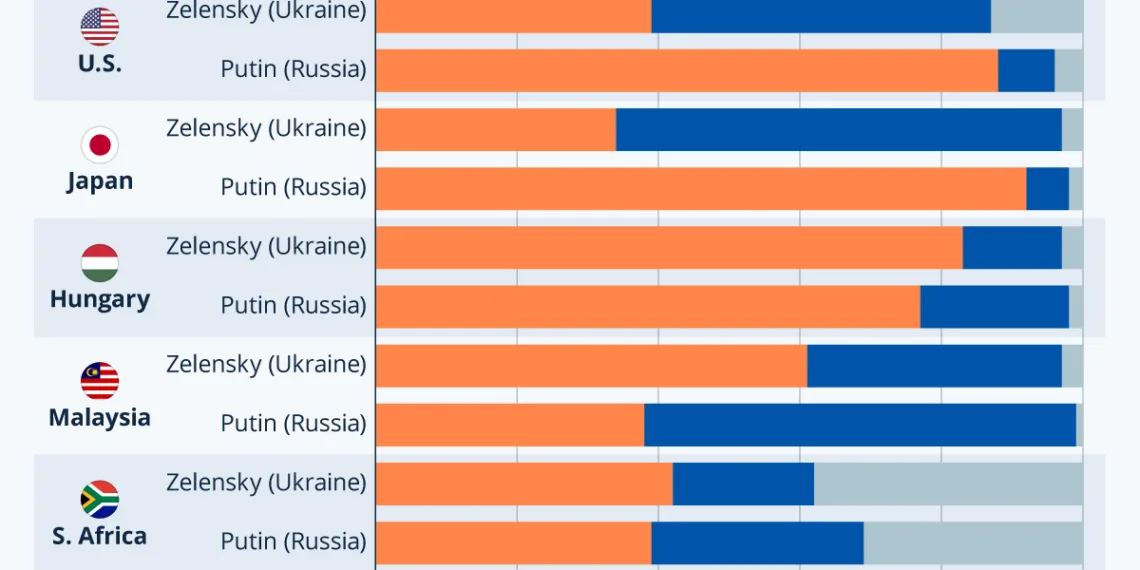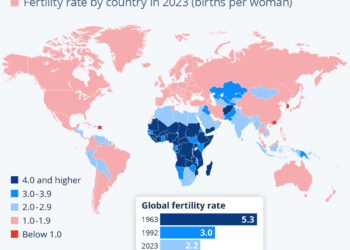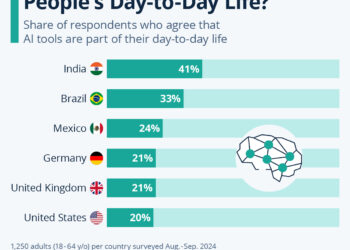Understanding Global Perception of Leaders: Zelensky vs. Putin
Introduction to the Survey
A recent survey conducted by the Pew Research Center sheds light on international perceptions of Ukrainian President Volodymyr Zelensky and Russian President Vladimir Putin. With a focus on trust levels, the survey included responses from 53 countries, revealing a complex landscape of opinions that highlight geopolitical alignments and sentiments.
Trust Levels in Europe
Strong Opposition to Putin
In Europe, particularly in Eastern Europe, the survey results indicate a dramatic lack of confidence in President Putin. Nearly all respondents from these nations expressed distrust towards the Russian leader. This widespread opposition reflects the historical and recent conflicts stemming from Russia’s actions in Ukraine, reinforcing solidarity among European nations against perceived aggression.
Mixed Feelings Towards Zelensky
While support for Zelensky is robust in most of Europe, there are pockets of skepticism. Countries such as Hungary have shown that some citizens feel more mistrust towards Zelensky than they do towards Putin. This nuanced sentiment often ties back to domestic politics and historical relationships with Russia.
Findings from the United States and Allied Nations
Confidence in Zelensky
The survey mirrors a strong belief in Zelensky from key allies such as the United States, Japan, and Australia. The prevailing sentiment in these nations reflects unwavering support for Ukraine amid ongoing conflict. This backing is indicative of broader strategic interests in maintaining stability in Europe and countering Russian influence.
Declining Support Beyond Core Allies
While the support for Zelensky remains high among his direct allies, the survey highlights a concerning trend as trust in both leaders dwindles in other regions. Countries that once stood in favor of NATO-aligned nations are beginning to see mixed responses, reflecting shifting political dynamics.
Latin America: A Complicated Landscape
Relative Trust in Putin
In Latin America, opinions are mixed. Although countries generally exhibit more mistrust towards Putin compared to Zelensky, certain nations, such as Malaysia and Bangladesh, surprisingly show positive inclinations towards Russia. This disparity highlights how geopolitical relationships and historical ties play a critical role in shaping public perceptions on the continent.
Dissecting Views in Asia
Complacency in South Asia
Responses from South Asian countries, particularly India, Sri Lanka, and Bangladesh, reveal a troubling trend of complacency around political issues. A significant portion of respondents opted for the "don’t know" response, signaling a lack of engagement or knowledge about the situation. Such attitudes may stem from complex economic ties with Russia, especially in relation to oil purchases.
Trust in Leaders
Interestingly, while Indian citizens may not be as critical of Putin, their perception of Zelensky doesn’t yield overwhelming trust either. This ambivalence illustrates how regional priorities can overshadow international conflicts, resonating more with domestic concerns than global narratives.
Insights from Africa
Split Opinions on Leadership
African nations showcased varied opinions, reflecting a fragmented understanding of the Russian-Ukrainian conflict. Specifically, in nations like South Africa, which is a BRICS ally of Russia, there seems to be a reluctant acceptance of both leaders. This represents a more significant trend in which countries balance their foreign policies amid competing pressures from various powers.
Additional Factors Influencing Perceptions
Economic Interests
The economic motivations behind relationships with Russia cannot be overlooked, as observed with India and China’s continued oil purchases. These decisions create a complicated network of dependencies that sometimes cloud political judgment.
Media Influence
The influence of media narratives and information flow plays a pivotal role in shaping public opinions about these leaders. The portrayal of Zelensky as a figure of resilience versus Putin as an embodiment of aggression steers perceptions but may not always align with ground realities.
Concluding Thoughts
Overall, the survey from Pew Research Center illustrates a dynamic interplay of trust and perception regarding Zelensky and Putin. As global alliances shift and evolve, understanding these sentiments is crucial for gauging the future of international relations in the context of ongoing conflicts.





